Hannah Lawrence (1758-1838) was the fourth great grand aunt of my wife. Hannah, like most members of the numerous Lawrence clan, was a Quaker, but she did not let this deter her from an assertive and adventurous life.
The Quakers, as pacifists, tired to stay neutral during the American Revolution, but most of the Lawrences sympathized with the American side and some of the teenage boys and young men joined the militia. Hannah was not to able to fight, but she was a poetess and used her poetic talents against the British.
In the poem “Interposition” she wrote: “They [the British] fly to crush the blameless son of freedom and of me.” She also wrote a poem “On the Purpose to which the Avenue Adjoining Trinity Church has of late been dedicated,1779,” about the behavior of British soldiers, had it privately printed and dropped it on sidewalks.
This is the scene of gay resort,
Here Vice and Folly hold their court,
Here all the Martial band parade,
To vanquish — some unguarded Maid.
Here ambles many a dauntless chief
Who can — oh great ! beyond belief,
Who can — as sage Historians say,
Defeat — whole bottles in array!
Heavens ! shall a mean, inglorious train,
The mansions of our dead profane?
A herd of undistinguish’d things.
That shrink beneath the power of Kings!
Sons of the brave immortal band
Who led fair Freedom to this land,
Say — shall a lawless race presume
To violate the sacred Tomb?
And calmly, you, the insult bear —
Even wildest rage were virtue here.
Shades of our Sires, indignant rise,
Oh arm! to vengeance, arm the skies.
Oh rise! for no degenerate son
Bids impious blood the guilt atone,
By thunder from the ethereal plains.
Avenge your own dishonored Manes,
And guardian lightnings flash around,
And vindicate the hallow’d ground!
In the meanwhile the British officer Jacob Schieffelin (about whom much more in future blogs) came to New York. He got one glimpse of Hannah and fell in love. He got himself billeted in the Lawrence house, and very shortly she returned his affections, having, as she said, “opportunity almost hourly of discovering new merits.”
Jacob Schieffelin
She wrote the story of the courtship. “A Journal of a Lady’s Courtship,” in which she assumed the name Lavinia and gave Jacob the name Altamont. On July 29, 1780 she wrote, “the World, the world will condemn me for imprudence.” She started thinking of a course of action that “would shock those whose esteem is most dear to me, and astonish those who ever heard the name of Mathilda,” under which she had written her anti-British poems.
John Lawrence, her father, was not happy, but she married Jacob secretly at a friend’s house. Two days later she was disowned by the Quaker meeting. She and Jacob set off to Montreal bearing dispatches. She wrote a journal of her trip. Here is her description of Niagara Falls.
I proceeded … by slow and intricate windings up that rugged mountain, and contemplated the native wilderness of the scene through which we passed, till my ears were struck with the approaching sound of the falling torrent, and a sudden shower gave us to know that it could not be far distant, while innumerable isicles shook from the trees, on our heads, at every breath of wind, and were as quickly replaced by the constant succession of vapours condensing on the branches.
A considerable River first appeared, rolling down a gradual descent, and forming with the rapidity of its motion over the broken rocks, as we approached nearer the bank which had been worn away to an amazing depth, we were struck with motionless astonishment at the stupendous object that met our view, neither our surprize nor the deafening noise we heard, would admit of exclamation, we therefore stood gazing in silent awe and admiration. The whole River rushing abruptly down a terrific precipice, and rebounding in shattered particles, from the violence of its fall on said rocks, to nearly the height from whence it had precipitated itself. The earth seemed to tremble at the shock, and our sinking hearts corresponded with the idea. …
We prepared to descend [the path] to a level with the River … this with great difficulty, caution and the assistance of poles to prevent slipping we effected. … one of the gentlemen … then led me to a point of the rock that projected out in front of the Fall, from whence I could see the River descend as it were from the clouds, and with my eye follow its course, from its first rushing over the top, till it reached the margin of the stream below. … I grew giddy at the view.
She also met Indians, including the Iroquois Loyalist Molly Brant.
Molly Brant, British Heroine
Joseph Brant, her brother
She was a bit taken aback at the personal jewelry worn by the Indian allies of the British.
The sight of a fire in the Wilderness drew us to it in the evening, and I as a little surprised to find it surrounded by Indians. Under the shelter of an inverted canoe were seated two Warriors, with their wives and children, they made room for me between them with the greatest civility and perceiving I was a little frightened…they desired me in their language to take courage. Their heads were shaved and painted, and their appearance altogether savage, but their manners were not at all so — I was shocked to see a scalp dangling by my side from one of their ears; it was the size of a dollar, and fixed in a wooden ring, while a lock of beautiful dark hair hang on his horrid shoulder. On my observing it, he pointed to his head and pronounced the word “Yankee.”
She and Jacob returned to New York after the Revolution. He took over the Lawrence’s fledgling pharmaceutical business, and she settled down to steady ways.
Jacob and Hannah
Jacob founded Manhattanville. There he built St. Mary’s Episcopal Church. It was a free church (no pew rents) and, as Hannah was an abolitionist, it welcomed blacks. Jacob and Hannah are buried in the church.
Old St Mary’s Episcopal, Harlem
Hic jacent Jacobus et Hannah
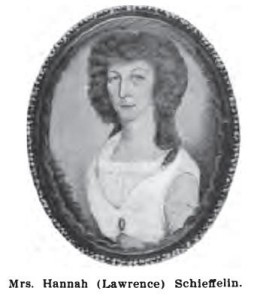
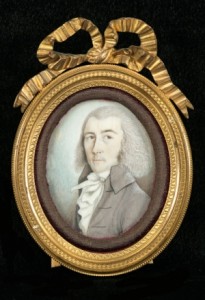
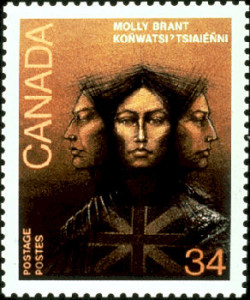
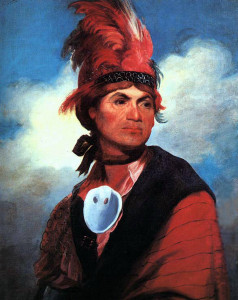
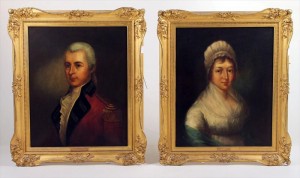
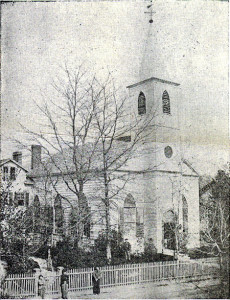
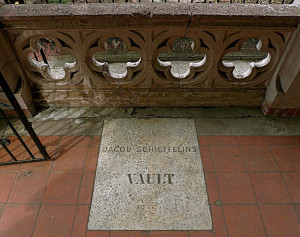
I think that is actually Molly’s brother Joseph Brant – an interesting character and probably the most famous Indian Loyalist. (While Iroquois men did let their long locks flow, that is a very masculine face.)
You’re right. I added Molly